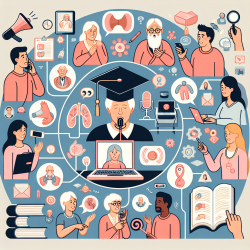In the dynamic landscape of educational support, the quest for innovative solutions to meet the diverse needs of students is never-ending. As Special Education Directors, we are constantly exploring new avenues to enhance our service delivery. It's with a sense of contentment and excitement that we delve into the burgeoning realm of online therapy in schools—a transformative approach that promises to redefine how we support our students' learning and developmental needs.
The integration of online therapy services, such as those provided by TinyEYE, into educational settings is a testament to the power of innovation in addressing some of the most pressing challenges we face today, including speech therapy staffing shortages. This digital leap not only expands our toolkit but also ensures that our students receive timely, effective, and personalized support, irrespective of their geographical location or the resources available in their immediate environment.
For educational psychologists and other professionals in the field, the shift towards online therapy opens up a plethora of opportunities. It's not just about filling online therapy jobs but about being at the forefront of a movement that leverages technology to break down barriers to access. This approach aligns with our commitment to inclusivity and equity, ensuring that every child, regardless of their circumstances, has the opportunity to thrive.
Online therapy in schools offers several compelling advantages:
- Flexibility: Therapists can provide services from anywhere, making it easier to address staffing shortages and ensure that students receive consistent support.
- Accessibility: Students in remote or underserved areas can access high-quality therapy services, reducing disparities in support.
- Engagement: Digital platforms often incorporate interactive and engaging tools, which can be particularly beneficial in keeping students motivated and involved in their therapy sessions.
As we continue to navigate the challenges and opportunities presented by online therapy, it's crucial for us to foster collaboration and share best practices. Networking with peers, attending conferences, and participating in webinars are invaluable for staying informed and inspired. Moreover, involving parents and guardians in these discussions ensures that they are active partners in their children's educational journey, reinforcing the support network around our students.
In conclusion, the innovation represented by online therapy in schools is more than just a temporary solution to current challenges. It's a forward-looking approach that has the potential to fundamentally transform how we provide educational support. As leaders in special education, we are tasked with ensuring legal compliance and overseeing the effective implementation of these services, but our role is also to be visionaries—embracing change, championing new technologies, and leading our schools and students into a future where every child has the tools and support they need to succeed.
Let's continue to innovate, collaborate, and inspire as we work towards a more inclusive and accessible educational landscape.










